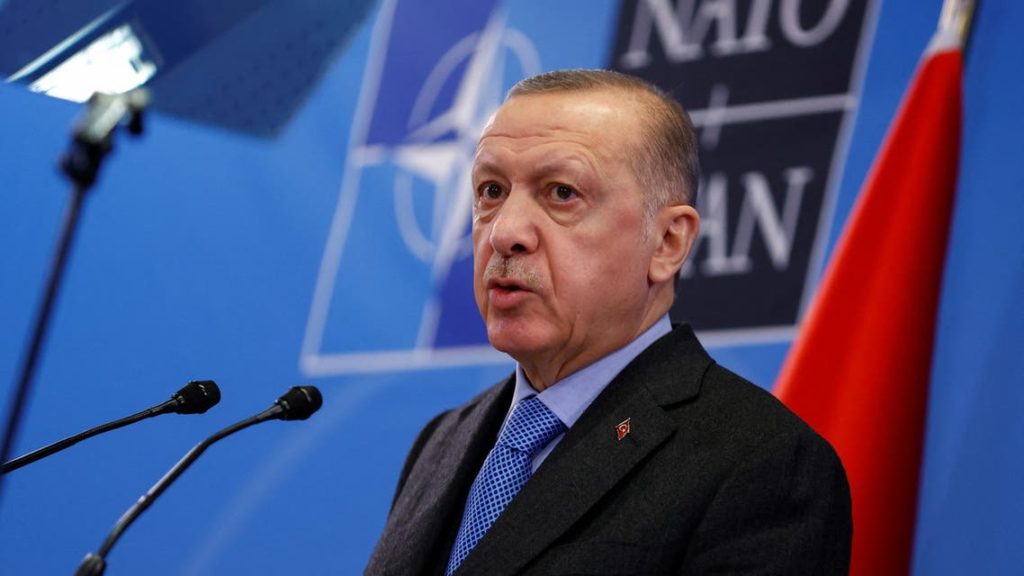
President Recep Tayyip Erdogan has confirmed that Turkey doesn’t want Finland and Sweden to join NATO. He also shot down a suggestion from the Nordic countries that they send delegations to Ankara to talk about the issue.
Erdogan said at a news conference on Monday, “We will not say ‘yes’ to those [countries] that put sanctions on Turkey to join NATO.” He was referring to Sweden’s decision to stop selling arms to Turkey in 2019 because of its military operation in neighboring Syria.
Turkey also said that the other two countries were hiding “terrorist” groups, like the Kurdistan Workers’ Party (PKK), which Turkey, the EU, and the US all consider to be dangerous.
Erdogan said, “Neither of the countries has a clear stance against terror groups.” “Why should we believe them?”
Monday, sources from the justice ministry told the state news agency Anadolu that Sweden and Finland had not agreed to extradite 33 people that Turkey had asked for over the past five years.
The agency said that Ankara was looking for people who were accused of having ties to the PKK and related groups or of being part of a group that was blamed for trying to overthrow Erdogan in 2016.
Turkey has criticized Stockholm, especially for what it sees as being soft on the PKK, which has been fighting the Turkish government with guns since 1984.
Earlier on Monday, the Swedish foreign office said that high-level representatives from Sweden and Finland planned to go to Turkey to talk about Ankara’s concerns.
Erdogan said in response, “Will they come to try to convince us? We’re sorry, but they shouldn’t even bother.” He also said that if the two countries joined NATO, it would become “a place where people from terrorist groups gather.”
Turkey has criticized Stockholm, especially for what it sees as being soft on the PKK, which has been fighting the Turkish government with guns since 1984.
Earlier on Monday, the Swedish foreign office said that high-level representatives from Sweden and Finland planned to go to Turkey to talk about Ankara’s concerns.
Erdogan said in response, “Will they come to try to convince us? We’re sorry, but they shouldn’t even bother.” He also said that if the two countries joined NATO, it would become “a place where people from terrorist groups gather.”
For Finland and Sweden to join NATO, all 30 of the alliance’s members have to agree, and Ankara is one of those countries.
Stefanie Babst, a former NATO deputy assistant secretary-general for public diplomacy and an analyst at the European Leadership Network, told Al Jazeera that “Turkey will, in the end, go along with the consensus and welcome Finland and Sweden as new members.”
She said, “In the meantime, they will try to negotiate to get something back.”
Turkey might want to get military equipment from Washington so it can update its old F-16 fleet and get more help from the West to help its struggling economy. On the home front, the analyst said that bringing up the PKK was a way to win over nationalist voters who support Erdogan.
The latest scolding from Ankara came after Sweden’s government made a formal decision to join NATO. The announcement was made by Prime Minister Magdalena Andersson on Monday, a day after Finnish President Sauli Niinisto said Finland would also apply to join.
“We are ending one era and starting a new one,” Andersson said at a news conference. He also said that the application could be turned in on Monday, Tuesday, or Wednesday and that it would be done at the same time as Finland.
Last week, Turkey surprised its NATO allies when it said it wouldn’t be interested in their applications.
On the sidelines of a meeting of NATO foreign ministers in Berlin on Sunday, Ankara took a more friendly tone and laid out its demands. It said it wanted the two countries to stop helping groups like the PKK and lift the ban on arms sales.
Even though Turkey is worried, US Secretary of State Antony Blinken said on Sunday that Sweden and Finland would be able to join NATO. NATO Secretary-General Jens Stoltenberg also said that he was confident that “we will be able to address the concerns that Turkey has expressed.”
On Wednesday, Mevlut Cavusoglu, the foreign minister of Turkey, will meet with Blinken in Washington. Ankara’s concerns are likely to be at the top of the agenda.




